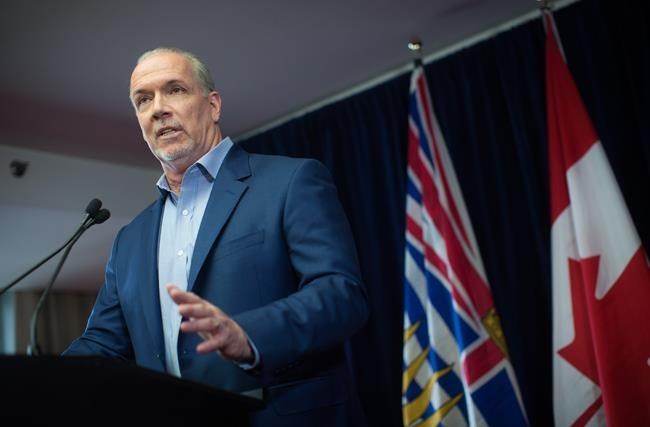British Columbia faces a two-week period of uncertainty until the final results are in from its tight election race, when it will become clearer whether the province has a minority or majority government.
Premier Christy Clark spoke to the lieutenant-governor on Wednesday after the Liberals squeaked out a razor-thin victory over the NDP, leaving the province with its first minority government in 65 years, if the results don’t change.
The premier’s office said Lt.-Gov. Judith Guichon has asked Clark to continue governing after the election.
> More election news at timescolonist.com/bcelection
Clark’s party won 43 seats while the NDP led by John Horgan collected 41 and the Greens under Andrew Weaver won three ridings in the 87-seat legislature. The Liberals only need one more seat for a majority.
But the outcome will remain unclear while 176,000 absentee ballots are counted, which could flip close ridings including Courtenay-Comox, where the NDP won by nine votes.
Even after the final results are announced May 24, tight finishes could trigger judicial recounts.
After the initial results were in Tuesday, Horgan said the outcome shows British Columbians want a change in government after 16 years under the Liberals.
But Clark had a different interpretation, saying she reads the results as a plea to the major parties to work together more effectively.
Asked several times Wednesday if she accepts personal responsibility for the Liberals’ showing, Clark avoided a direct answer.
“British Columbians sent a very strong message to all sides of the legislature. They want us to work together collaboratively and across partisan lines,” said Clark, who was trying to win the party’s fifth straight majority government.
The Liberals lost seats in Metro Vancouver and several cabinet ministers were defeated.
The difference between the Liberals and NDP in the popular vote on Tuesday was about 17,800 votes in favour of Clark’s party.
With three seats, the Green party holds the balance of power in the legislature — a remarkable position for Weaver after becoming the first Green elected four years ago.
Weaver said he called both leaders to congratulate them. Both Horgan and Clark said on Wednesday that they intend to sit down with Weaver to talk about working together.
Horgan said he and Weaver agree that the Liberals have failed British Columbians on many issues. But Horgan would not make a commitment to working with the Green leader in a minority government.
Asked what stopped the NDP from winning, Horgan said the game was still on.
“There’s still 176,000 seconds on the clock and I’m going to wait to see what the final outcome is,” he said, referring to the number of absentee ballots still to be counted.
Weaver said his party would negotiate with both party leaders in the coming weeks and would work with whoever has the most commonality with the Green platform.
“The most important issue for us right now, the number one deal breaker, is banning big money in B.C. politics,” he said.
B.C. allows unlimited corporate and union donations and the RCMP is investigating fundraising by political parties. The NDP has promised to ban the donations, while the Liberals have said they’ll convene a panel to review them.
But don’t expect negotiations on the possible framework of a minority government to start until after the dust settles, said Richard Johnston, a political scientist at the University of British Columbia.
“It’s entirely possible, first of all, that it won’t be a minority government,” he said.
“Substantively, it’s easier to imagine a deal between the Greens and the NDP — not personality wise, but on substance. John Horgan has already signalled the basis of the deal.”
Horgan said Tuesday that a majority of British Columbians voted for a new government and that needs to be considered. He said voters want changes to political fundraising laws and electoral reform — two of the Green party’s priorities.
Johnston said if the results remain a Liberal minority government with the Greens holding the balance of power, Weaver has to be careful. Supporting minority governments is usually perilous for the smaller parties, he said.
In Weaver’s case, that could also mean supporting the NDP to achieve his goals.
“If the results are as they are now, 43 seats for the Liberals, that means that in order to effect the change that I think Weaver reasonably interprets the electorate to have called for, (it) does require him to support the loser. Optically, that’s not great.”
— Follow â??ellekane and â??gwomand on Twitter.
17:22ET 10-05-17



